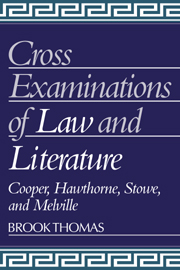Book contents
- Frontmatter
- Contents
- Acknowledgments
- List of abbreviations
- An Opening Statement
- PART I INDIVIDUALS, JUDGES, PROPERTY
- 1 The Pioneers; or the Sources of American Legal History: A Critical Tale
- 2 The House of the Seven Gables: Hawthorne's Legal Story
- 3 The House of the Seven Gables: Hawthorne's Romance of Art
- PART II WAGE AND CHATTEL SLAVERY
- PART III BILLY BUDD AND RE-RIGHTING LEGAL HISTORY
- A Closing Statement
- Notes
- Index
3 - The House of the Seven Gables: Hawthorne's Romance of Art
Published online by Cambridge University Press: 08 October 2009
- Frontmatter
- Contents
- Acknowledgments
- List of abbreviations
- An Opening Statement
- PART I INDIVIDUALS, JUDGES, PROPERTY
- 1 The Pioneers; or the Sources of American Legal History: A Critical Tale
- 2 The House of the Seven Gables: Hawthorne's Legal Story
- 3 The House of the Seven Gables: Hawthorne's Romance of Art
- PART II WAGE AND CHATTEL SLAVERY
- PART III BILLY BUDD AND RE-RIGHTING LEGAL HISTORY
- A Closing Statement
- Notes
- Index
Summary
The Jacksonian version of American history questioned the disproportionate share of property held by the rich. According to Jacksonians, this wealth was rarely earned by labor. Furthermore, very often the rich had displaced the original owners of the soil and then used their power and influence to make that displacement legal. In contrast, the Whig version of history legitimized the division of wealth by constructing a continuous line of inheritance and acquisition from the original, rightful owners of the soil to the present-day owners. These contrasting versions of the past led to different narratives about the Indians' claim to the land.
In his speech entitled “History and Influence of the Puritans”, Joseph Story tried to explain how the Indians had lost their land. Story expresses great sympathy for them. He admits that they have been dealt with unjustly. He denies European claims to either possession or discovery.
“If, abstractly considered, mere discovery could confer any title, the natives already possessed it by such prior discovery. If this were put aside, and mere possession could confer sovereignty, they had that possession, and were entitled to sovereignty”. In the landmark Cherokee Nation v. Georgia case a few years later, Story stuck to his beliefs and recorded one of his rare dissents with Marshall when the chief justice denied the Cherokees the status of a foreign nation.
But in his Salem speech Story goes on to argue that the Puritans, unlike other European settlers, had not dealt with the Indians unjustly.
- Type
- Chapter
- Information
- Cross-Examinations of Law and LiteratureCooper, Hawthorne, Stowe, and Melville, pp. 71 - 90Publisher: Cambridge University PressPrint publication year: 1987



